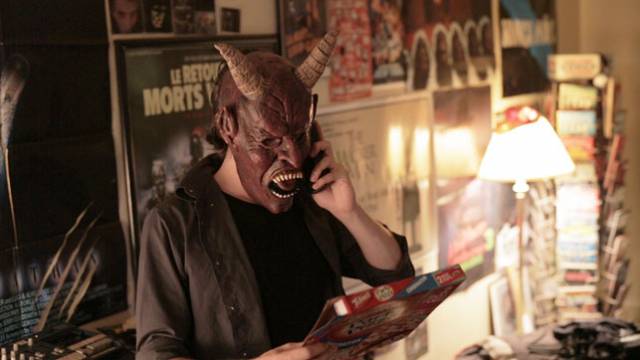
 Joel Potrykus’s Buzzard, follows Marty (Joshua Burge), a small-time con artist living from scam to scam for income. Not shy about his anti-establishment, anti-corporate attitude, Marty neglects all responsibilities at his temp job in favor of stealing office supplies for the refund money and conning his way into free frozen pizza. When his biggest scam to date–trying to pocket $2,000 in mortgage money that isn’t his–ends up backfiring, Marty becomes more and more wrapped up in his own misdirected rage, fury, and paranoia.
Joel Potrykus’s Buzzard, follows Marty (Joshua Burge), a small-time con artist living from scam to scam for income. Not shy about his anti-establishment, anti-corporate attitude, Marty neglects all responsibilities at his temp job in favor of stealing office supplies for the refund money and conning his way into free frozen pizza. When his biggest scam to date–trying to pocket $2,000 in mortgage money that isn’t his–ends up backfiring, Marty becomes more and more wrapped up in his own misdirected rage, fury, and paranoia.
Buzzard, begins with a keen sense of how to distinguish Marty from his coworkers, by making them irksome, nagging, and occasionally snooty. By default, the audience latches onto Marty and wants him to succeed over them. Over time, though, it becomes less clear whose side we ought to be on. Burge’s portrayal of Marty, albeit unnerving, is ambiguous at times. For example, there are a few silent scenes during which it is easy to confuse what is meant to be paranoia with diabolical premeditation. There are also bizarrely goofy moments between Marty and his coworker, Derek (Potrykus) that although accurately depict the innate weirdness of office friendship, (that is, friendship fostered by proximity), seem superfluous to the essence of Marty’s story. In other words, so much time is spent showing us Marty and Derek together, bickering about Nintendo and such, but it is unclear what that has to do with Marty’s struggle.
Ultimately, Marty pays a high price for his escalating rage–his peace of mind. And yet, the most interesting part of Marty is what we see the least of. It isn’t how he unravels that is fascinating or meaningful, but what causes him to unravel. Where does this hostility to the world around him come from? Is it fear masked as rage? If so, then what is he afraid of? At several points in the film he vents his attitude that he’s just a regular guy, and corporatization, mortgage companies, and corruption is what surrounds him. However, we don’t see this corruption in action, we only hear about it from Marty.
It’s difficult to understand what Buzzard is trying to say about its characters, because of its complicated, muted tone. At times, we root for Marty, and at other times he seems pathetic. Take, for example, how all of his cons are designed to benefit himself financially. This, in practice, makes him just as selfish as people higher up on the totem pole committing the “corporate thievery,” he condemns. And so, without a clear sense of how to feel about Marty’s progressively violent behavior, we can’t begin to decide whose side we should be on. Buzzard is on the right track, and pointing a finger at the right people, but would resonate much more powerfully with a more focused approach.